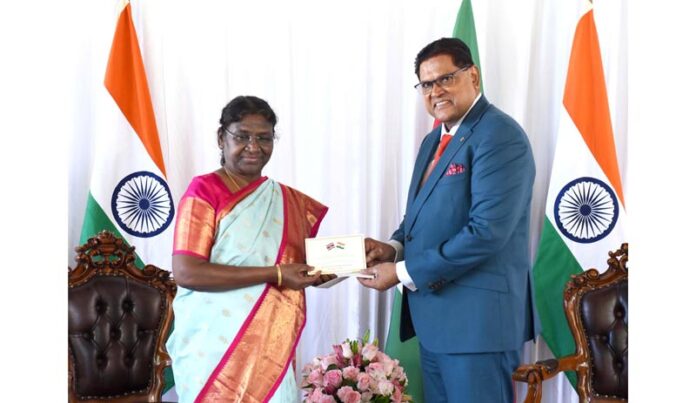-
“Today, on this historic occasion, I am very pleased to announce at this forum that my government has approved extending the eligibility criteria for the Overseas Citizenship of India (OCI) card from the fourth generation to the sixth generation.”
— Droupadi Murmu, President of India
-
The first ship – Lalla Rookh – carrying 452 Indian labourers arrived in Suriname’s capital Paramaribo on June 5, 1873. Most of the labourers hailed from eastern Uttar Pradesh and Bihar
President of India Droupadi Murmu announced, during her visit to Surinam, India had decided to extend the eligibility criteria for Overseas Citizen of India card of the original Indian immigrants in Suriname from the fourth generation to the sixth generation. This marked their importance in the 150-year-old bilateral relationship. The President made the announcement while addressing a gathering at the Independence Square in Paramaribo e where she along with Suriname counterpart Chandrikapersad Santokhi witnessed a cultural event on the occasion of the commemoration of 150 years of the arrival of Indians in Surinam. The President was at Surinam on June 6.
The first ship – Lalla Rookh – carrying 452 Indian labourers arrived in Suriname’s capital Paramaribo on June 5, 1873. Most of the labourers hailed from eastern Uttar Pradesh and Bihar. “Today, on this historic occasion, I am very pleased to announce at this forum that my government has approved extending the eligibility criteria for the Overseas Citizenship of India (OCI) card from the fourth generation to the sixth generation,” said Murmu.
She said that the OCI card could be seen as an important link in their 150-yearold relationship with India. She urged members of the Indian diaspora to continue to make efforts to maintain their connections with India. Earlier, there was a limitation that OCI could be issued only to four generations of the original forefathers of the community who had migrated from India to Suriname. Consequently, many young members of the community belonging to the fifth and subsequent generations were deprived of this benefit.
“It is my hope that in the days to come, the Indian community will continue to strengthen this relationship, and each and every individual among you will continue to act as a bridge between India and Suriname, connecting both countries. On this occasion, I invite all of you to come to India, to witness India’s development journey and to participate in it.”
— President Murmu
“We are all gathered here today to celebrate the 150th Anniversary of the arrival of Indians in Suriname, an important milestone in the history of Suriname. On this occasion, I pay my respects to our ancestors, and I salute those that helped build this nation,” the President said. She appreciated the people of Suriname for their dedication and commitment to unity and inclusiveness. The President said she was happy to note that despite the vast geographical distances, the different time zones and cultural diversity, the Indian diaspora has always remained attached to their roots. There are so many similarities between India, which is well known for its diversity, and Suriname. “The people of both countries could integrate very easily in each other’s societies. I feel like I am at my own home!” she said.
She said that over the last 150 years, the Indian community has not only become an integral part of society in Suriname, but it also constitutes an important pillar of the deepening partnership between India and Suriname. “It is my hope that in the days to come, the Indian community will continue to strengthen this relationship, and each and every individual among you will continue to act as a bridge between India and Suriname, connecting both countries. On this occasion, I invite all of you to come to India, to witness India’s development journey and to participate in it,” she said.
Earlier on the same day, the President paid homage at the Baba and Mai monument, a symbolic representation of the first Indian man and woman, who first set foot in Suriname. Subsequently, she paid her respects at the Mama Sranan monument which represents Mama Sranan, the Mother of Suriname holding her five children, the five ethnicities that inhabit Suriname with care and affection. She also attended a luncheon banquet hosted in her honour by the President of Suriname. In her banquet speech, President Murmu underlined India’s approach to an inclusive world order that is sensitive to the legitimate interests and concerns of every country and region.
*****************************************************
Readers
These are extraordinary times. All of us have to rely on high-impact, trustworthy journalism. And this is especially true of the Indian Diaspora. Members of the Indian community overseas cannot be fed with inaccurate news.
Pravasi Samwad is a venture that has no shareholders. It is the result of an impassioned initiative of a handful of Indian journalists spread around the world. We have taken the small step forward with the pledge to provide news with accuracy, free from political and commercial influence. Our aim is to keep you, our readers, informed about developments at ‘home’ and across the world that affect you.
Please help us to keep our journalism independent and free.
In these difficult times, to run a news website requires finances. While every contribution, big or small, will makes a difference, we request our readers to put us in touch with advertisers worldwide. It will be a great help.
For more information: pravasisamwad00@gmail.com



